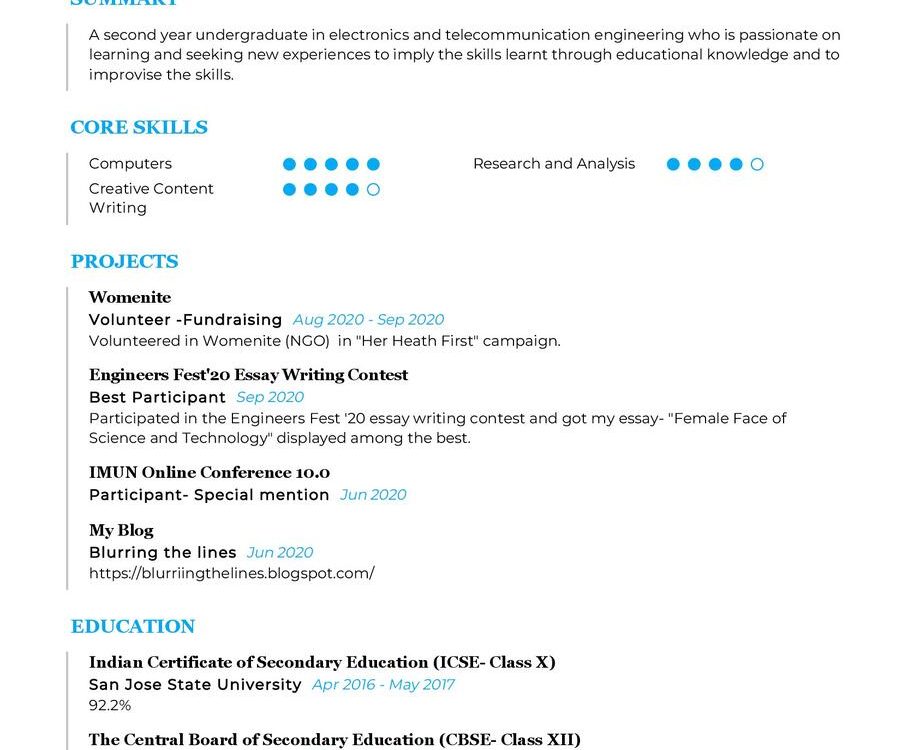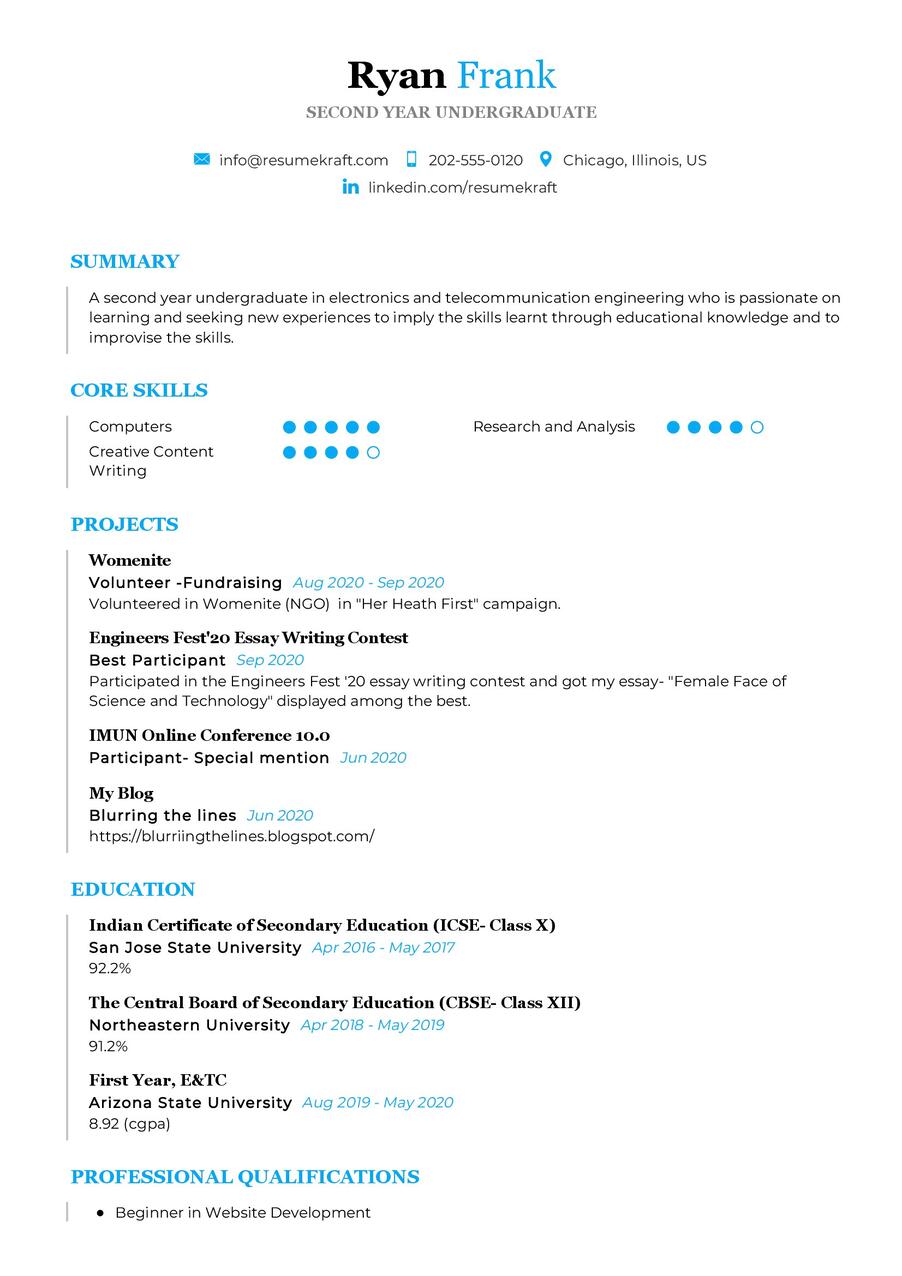Navigating the Second Year Undergraduate Journey
Embarking on the second year of your undergraduate studies is a significant milestone in your academic journey. As you delve deeper into your chosen field of study, the opportunities and challenges multiply. This article will guide you through the role, requirements, and responsibilities of a Second Year Undergraduate, offering valuable insights to help you shine in your CV and interviews.
What is the Role of a Second Year Undergraduate?
The second year of undergraduate studies is a pivotal phase where you transition from foundational courses to more specialized ones. Your role during this period involves not only excelling academically but also exploring your interests, building a solid academic foundation, and preparing for internships or research opportunities. Let’s explore the multifaceted role of a Second Year Undergraduate in more detail.
As a Second Year Undergraduate, you are expected to:
- Deepen your understanding of your major field of study.
- Explore elective courses that align with your interests and career goals.
- Participate in extracurricular activities to enhance your skills and broaden your network.
- Consider potential internships or research opportunities to gain practical experience.
- Seek mentorship from professors or professionals in your chosen field.
Your role extends beyond the classroom, encompassing a holistic approach to personal and academic growth.
What are the Second Year Undergraduate Academic Requirements?
Navigating the second year of undergraduate studies comes with a set of academic requirements that lay the foundation for your future success. Here are the key academic requirements to focus on during your second year:
- Maintain a strong GPA by excelling in core and elective courses.
- Explore and choose a major or specialization that aligns with your career goals.
- Engage actively in class discussions and group projects to enhance your interpersonal skills.
- Consider joining academic or professional organizations related to your field.
- Begin thinking about potential research topics or internship opportunities for the upcoming years.
Meeting these academic requirements will not only strengthen your CV but also prepare you for the challenges and opportunities that lie ahead.
Responsibilities of a Second Year Undergraduate
The responsibilities of a Second Year Undergraduate go beyond academic achievements and extend to personal development and career preparation. Here are some key responsibilities to embrace during your second year:
- Manage your time effectively to balance academic commitments and extracurricular activities.
- Build relationships with professors, peers, and professionals in your field.
- Attend career fairs and networking events to explore potential internship or job opportunities.
- Consider joining student clubs or organizations to enhance your leadership and teamwork skills.
- Seek guidance from career counselors to refine your career goals and strategies.
These responsibilities contribute to your overall growth and will become valuable talking points in your future CV and interviews.
Second Year Undergraduate CV Writing Tips
As you start thinking about crafting your CV, consider these tips to make it stand out:
- Highlight academic achievements, including any honors, scholarships, or research projects.
- Detail relevant coursework and projects that showcase your skills and interests.
- Include any leadership roles or active participation in student organizations.
- Emphasize soft skills such as communication, teamwork, and time management.
- Seek feedback from professors or career advisors to tailor your CV to your chosen industry.
Your CV is a snapshot of your academic and personal journey, so make it reflect the unique qualities that set you apart.
Second Year Undergraduate CV Summary Examples
Your CV summary is the opening statement that introduces you to potential employers or academic advisors. Here are some examples to inspire your CV summary:
- “Second Year Undergraduate with a passion for [your major], excelling in coursework and actively involved in [relevant clubs or activities]. Seeking opportunities to apply academic knowledge in real-world settings through internships or research projects.”
- “Motivated Second Year Undergraduate specializing in [your major], with a proven track record of academic excellence and strong interpersonal skills. Eager to contribute to [specific projects or initiatives] that align with career goals.”
- “Dedicated Second Year Undergraduate with a keen interest in [your major], demonstrating leadership in [relevant student organizations]. Ready to leverage academic knowledge and enthusiasm for [specific industry] in internship or research roles.”
Customize your CV summary to reflect your unique strengths and aspirations as a Second Year Undergraduate.
Create a Strong Experience Section for Your Second Year Undergraduate CV
Your experience section may not be as extensive as that of a seasoned professional, but it can still showcase your journey during the second year. Here are some examples to guide you:
- “Completed a challenging [specific project or coursework] that enhanced problem-solving and critical thinking skills.”
- “Participated in [name of a relevant extracurricular activity] and contributed to [specific achievements or initiatives].”
- “Collaborated with peers on [group project or assignment] to develop teamwork and communication skills.”
Your second-year experiences are building blocks for future success, so highlight them effectively in your CV.
Sample Education Section for Your Second Year Undergraduate CV
Your education section is a crucial part of your CV, showcasing your academic journey. Here’s how you can present your second-year education:
- Bachelor of [Your Major], [Your University], [Expected Graduation Year].
- Relevant coursework: [List key courses related to your major].
- Academic Achievements: [Honors, scholarships, or noteworthy projects].
Each educational milestone contributes to your overall narrative, so present it with clarity and pride.
Second Year Undergraduate Skills for Your CV
Your skills are the tools you’ve developed during your second year that set you apart. Here are some essential skills for a Second Year Undergraduate to include in your CV:
Soft Skills:
- Time management, demonstrated through balancing coursework and extracurricular activities.
- Communication skills, honed through class discussions, presentations, and group projects.
- Adaptability, as evidenced by your ability to navigate various academic and personal challenges.
- Leadership, showcased through involvement in student clubs or group activities.
- Problem-solving, developed through coursework and collaborative projects.
Hard Skills:
- Proficiency in relevant software or tools related to your major.
- Data analysis or research skills, depending on your field of study.
- Language proficiency, if applicable and relevant to your career goals.
- Technical skills acquired through coursework or personal projects.
- Research and critical thinking, demonstrated through academic achievements.
Each skill is a testament to your growth and readiness for the next steps in your academic and professional journey.
Common Mistakes to Avoid When Writing a Second Year Undergraduate CV
As you craft your CV, avoid these common mistakes that can hinder your chances:
- Avoid using a generic template; tailor your CV to highlight your unique experiences and skills.
- Don’t underestimate the value of extracurricular activities; they can showcase your well-roundedness and soft skills.
- Steer clear of jargon; use simple language that effectively communicates your achievements and aspirations.
- Avoid providing too much detail; focus on key accomplishments and experiences that relate to your goals.
- Proofread your CV thoroughly to eliminate any grammatical or formatting errors.
Each mistake is a potential roadblock, so ensure your CV is polished and impactful.
Key Takeaways for Your Second Year Undergraduate CV
As you craft your CV for your second year of undergraduate studies, keep these key points in mind:
- Highlight academic achievements, extracurricular involvement, and personal growth.
- Customize your CV to align with your chosen major and career aspirations.
- Emphasize soft skills developed through coursework, projects, and group activities.
- Showcase your readiness for internships, research opportunities, or future career endeavors.
Your CV is a dynamic document that evolves with your journey, so make it a compelling reflection of your second-year experiences and aspirations.
Finally, feel free to utilize resources like AI CV Builder, CV Design, CV Samples, CV Examples, CV Skills, CV Help, CV Synonyms, and Job Responsibilities to create a standout application and prepare for the [job type] job interview.


